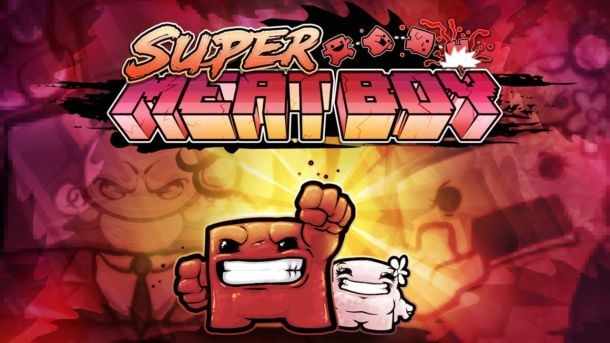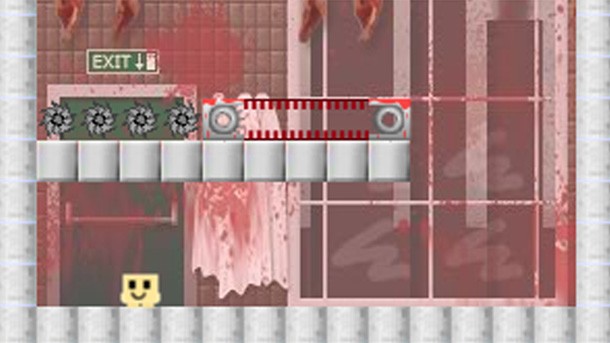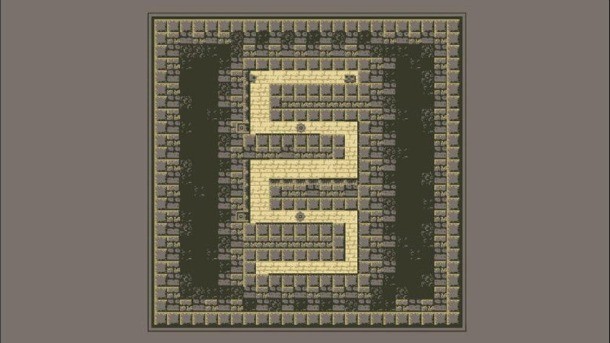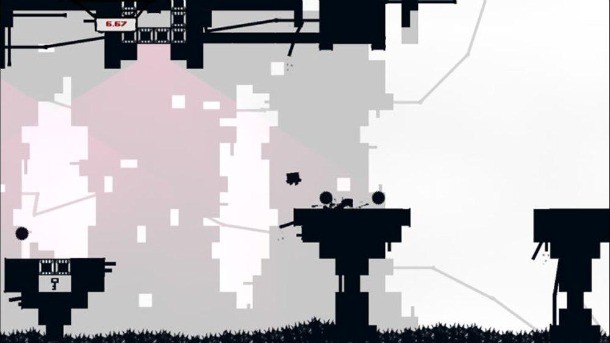Please support Game Informer. Print magazine subscriptions are less than $2 per issue
Super Meat Boy Afterwords

We spoke with creators Edmund McMillen and Tommy Refenes at length about the origins of Meat Boy, battling PETA, designing Braid characters, and why they'll never make another punishing platformer again.
How did the idea for Meat Boy first come about?
Edmund McMillen, artist and designer: I got tired of my old designs like Gish. I wanted to come up with new characters and I wanted them all to be superheroes with something very wrong with them -- like some sort of major downside. One of them was Meat Boy, which was originally called Inside Out Ninja, who was a ninja that was super agile, but had no skin so he was in pain always and if he touched anything he would die. And then Dr. Fetus who was a genius evil villain, but he was a fetus in a jar. First I did Meat Boy with a friend of mine named Jon McEntee. Tommy wasn’t involved in the original prototype. But that was around the time that I was starting to work with him. I think it took about three weeks. I didn’t really think much of it, honestly. It was just a really basic platformer that was going to be super hard. It suddenly became one of my most popular Flash games.
And then shortly after that I started working with Tommy on a game called Grey Matter. And that did pretty well, too. It was around that time that I released a CD called This Is A Cry For Help that was a collection of my work. It was around that time where publishers started contacting me and asking if I wanted to work on console games. One of the first people to contact me was Nintendo. And that was actually in response to this video that I did where I kept calling Reggie [Fils-Aime, president of Nintendo of America, about getting on WiiWare].
I basically started talking to Nintendo, but I didn’t really have any options in doing a console game because nobody that I knew actually could program for a console. And then suddenly I realized that Tommy could program for consoles because that’s what he used to do. I was like “Hey, Tommy. Want to do a Wii game?” And Tommy’s like “Yeah, maybe.”
We just pooled our money and got a kit and started working on the Wii version. Around that time as well I was talking to Microsoft and I was working on doing a console version of Gish or Gish 2 and that fell to pieces because the guy that I was working with also fell to pieces. So we kind of did the switcherooni with Microsoft and said “Hey, what about Meat Boy?” They said okay and that was that.
When did you realize that Super Meat Boy was going to be a bigger project than it was originally?
Tommy Refenes, programmer and designer: It was probably when Nintendo flew me out to this London event in September 2009. The reception to the game there was insane. People just kept coming back to our game and playing it over and over and over. At that time we were only planning on like 100 levels, no bosses, nothing really special -- just a very small game that we were going to put out. It was never even in our heads to sell it for anything more than $10. But when we saw people playing it it was just like, "We should probably go above and beyond with this one." It just kind of ballooned from there and we just kept adding to it. Do you remember when we decided to add bosses?
McMillen: I remember sketching up the first boss right when you came back. I think it was when you were telling the story about how the guy from Konami...
Refenes: Oh, when I showed him the replay thing and he was like, “We’re going to steal that.” And I said, “You better hurry.” [laughs]
McMillen: Around that time we were talking about releasing the game in March on Wii and we secured the deal with Microsoft officially. It took us like four months to finalize the deal with them and actually officially announce. We’re like, "Why not go all out and push ourselves to the limit since we’re already pushing it back past March? We’ll go for Summer of Arcade and just beef it up as much as we can." And I decided to double the levels because I’m [crazy].
Quantum Mario
How did you come up with the multi-death replay system?
Refenes: Basically, there’s a video that’s been floating around on the Internet for awhile. It’s a modded Super NES emulator that’s rigged to play custom-made Super Mario World levels. They rigged the emulator so it would record every attempt and then overlay them and play them at the same time. So this one video, it’s called Quantum Mario, it’s just one Mario jumping from platform to platform and he’ll fall off on the left, fall off on the right, or get hit with a bullet, or jump off of the bullet. It’s just every one of his attempts. It starts through this incredibly difficult level and just goes all the way through until it’s just one guy remaining. I love that video and I was like “We should do that with Meat Boy and I can do it in real time.” I just kind of coded it in over a weekend or something and perfected it as we were going through the development. It was an on-the-whim kind of thing. And it worked out as a great reward for f---ing up.
McMillen: You’d be surprised at how many things that were implemented that were as simple as what Tommy described. One of us says “Hey, wouldn’t it be really funny or wouldn’t it be really cool if..." and then we’d do it. Seriously, the last one was when the PETA thing came out and one of us said, “Wouldn’t it be funny if Tofu Boy was actually in our game but he was so s----y you could barely beat a level with him?” We can do that. At that was it. It took like 45 minutes to make him and Tommy put him in [the PC version] and "the end."
How fast was that total turnaround?
McMillen: It was a few hours for sure.
Refenes: Yeah, it was quite hilarious.
McMillen: Imagine Meat Boy at one quarter of the speed and one quarter of the jumping power.
Refenes: Also, when he sits still he pants. That’s my favorite part right there.
PETA's Tofu Boy
Have you guys been in contact with PETA?
McMillen: I wish. They must have a guideline where they attack and then they don’t respond. Because we responded to them a lot and we’re waiting. We can play this game. We can go back and forth forever. It’s funny. PETA actually does care about making themselves look bad so they would never say something lewd or anything else. And that’s usually the best way to win these sorts of arguments.
They never even f---ing responded. The only thing that came close to it was, and I don’t even know if it’s them, but whatever company they paid to do the game and do the campaign also made a full Twitter. They tried to maintain it, but I believe they kind of gave up. Tofu Boy tried to start a fight with Meat Boy, but then got owned horribly.
Refenes: PETA actually did respond to us announcing that Tofu Boy would be playable the next day. It was just basically “We’re pleased that they’re putting in Tofu Boy, and because vegetarians live longer, healthier lives we’re banking on Tofu Boy to be the best character.“ Joke’s on you. He can’t even beat the first level!
Did PETA’s campaign affect Super Meat Boy’s sales?
McMillen: Oh yeah, for sure. We got this huge peak on everything. Our sales went up on Xbox and PC. Our website was down during peak hours for two days. We got like 5,000 Twitter followers. It helped us much more than it helped them. I don’t even know what they got from it except looking foolish. 
Speaking of extra characters, what about the ones you actually wanted in your game? Are you guys pals with a lot of other indie developers?
McMillen: I played around with adding unlockable characters in the Flash version and I thought it would be really cool. Me and Tommy grew up with most of these people. We've known Tom Fulp for over ten years. He kind of gave us our start. Everything came from Newgrounds. He was one of the only people doing indie games back then. So it was pretty easy to get anything Tom worked on. He was more than happy to do that.
And then Tim from Braid, I had designed that character so it was an easy grab as well. Everybody else was all people who we kind of knew. The only developer that we didn’t know personally was Michael O’Reilly who did I Wanna Be The Guy, but after we added the Kid in now he’s like a friend of ours. He’ll hopefully be doing a whole chapter once the level editor is out -- genuine Kid levels from the developer himself. And the Gaijin guys from Bit.Trip are local to Santa Cruz so I know them personally and visit them all the time.The indie scene is quite tight knit. Everybody knows each other.
The only developers that said no were the guy that made Cave Story and the team that did La-Mulana. We just hear that Japanese developers aren’t keen on crossovers. That’s all we’ve heard. Flat out no without hesitation from them. Oh, well.
I didn’t know you did the character design for Braid.
McMillen: Yeah, I designed Tim. I actually did all of the animations for the game as well. It was a long process, though. I worked with Jon [Blow] for a year on it and did all of the animation and all of the character design. Then, once David [Hellman] came in and did all of the background stuff, Jon wanted that style to go through everything. David just painted over my sprites. It wasn’t sprites like 8-bit sprites. It looked more like a cartoony style. Not painterly.
How did you go about making a game that people love to be punished in?
McMillen: It took a lot of thought. The Flash version of the game was quite s----y. It was a prototype and there were a lot of flaws with it. It was like, “How can we even start to attempt to reinvent a punishing platformer and make it fun? How can we make something retro feeling but reinvent the difficulty aspect of it?" If you remove lives, if you keep the levels short, if you give a lot of visual reward for even failing, you can get the player in this comfortable environment and then they’re totally okay with throwing themselves into it. It’s the art of not punishing. Something can be difficult and be very enjoyable.
People don’t run races and then everybody finishes at the same time. Races are hard and one person wins. With Meat Boy, they’re all on an equal playing field, but we’re not holding their hand through the process so not everybody makes it to the finish line. Not everybody gets there and gets that glory, but each level in itself will feel like they did it themselves and they feel so good about it because they weren’t discouraged by something. You don’t want to tell them what they need to do so it doesn’t feel empty in the end. That was basically the design. With that you can just make it super f---ing hard and they'll still feel really awesome when they beat it.
What has the process of working with Microsoft been like?
Refenes: Working with Microsoft has been very difficult. We have fought to try to get what we were owed, not money or anything, it’s nothing like that. What we were owed as far as promotion and promises that were made and all that stuff. It’s difficult to get those. Working with Steam is amazingly easy and straightforward. There’s no headache at all. They know how to promote a sale, and they know how to treat their developers. Microsoft doesn’t do that as well. They’re kind of falling in that department. I don’t know why. They thought our game was going to do a lot worse than what it did. It’s not that our game did bad. Our game did very very well. They just didn’t expect it to do well. They expected it to be a short burst flame that just kind of went away.
You guys were able to work out arrangements for a debut sale price and “Teh Internets” level downloads.
McMillen: That was the thing. It’s a hard thing to talk about. Our contact with Microsoft is through our producer. [Kevin Hathaway] is amazing. He’s the greatest guy that’s working there. He was the producer for all the really good indie games that have come out in the last couple years. He was 100 percent behind us. He’s the reason why the game is out there. If it wasn’t for him, Microsoft would have said “This looks like a Flash game. Why would anybody play this?” But he backed the game and convinced them that this is something that’s going to do well and we got the deal and went through with it.
We just happened to be in development when Microsoft was developing Kinect and putting all of their focus on that. We happened to launch in the hardest week of the hardest month, most competitive-wise for any video game. And we launched alongside Costume Quest, which was bizarre for us because we thought we would get an exclusive week. I’m sure Double Fine was even more upset over that. It was like all of these bizarre factors that lined up. Seemingly just bad luck. It’s nice to still have come out on top. All we can chalk it up to is there is a lot of people at Microsoft and there is a lot of confusion and hopefully that’s all it was. It’s hard to talk about without saying things we can’t say. It’s such a Catch-22 to talk about because we don’t want to sound ungrateful. We did amazing. We are incredibly grateful for being on the service and everything else. And again we loved the people that we worked with.
How did the music come together?
McMillen: I met Danny [Baranowsky] right around the Meat Boy prototype in 2007. He had done music for a game called Gravity Hook and then he would later go on and do the music for Canabalt. I really like his music. He knows what he’s doing. Just really amazing. I knew right away that we had to have him in the prototype. So I used him for music for the prototype and then of course once we got the console deal we had to have him back for that. He went all out. The guy f---ing made 40 tracks for the game. And he did it efficiently and instantly. He’s an amazing musician and I’m sure we will definitely be using him in everything we do as long as he will have us.
Danny Baranowsky's Canabalt soundtrack
Super Meat Boy has a lot of gaming references throughout. Are there any super obscure ones that not as many people are recognizing?
McMillen: The whole reason for the references is me and Tommy said “Okay what do we want to make? “ And we talked about being 10-13 years old and being on the schoolyard and being huge fanboys about some game. We wanted to make something that would recreate our childhood and just kind of sum that up -- that some kid would argue about why it’s the best game. So we just pulled all of these references of memories from when we were young and threw it in. And a lot of what came through were inside jokes.
One of them was [from] that movie The Wizard. There’s that whole part where “You got 50,000 on Double Dragon?!” like that’s a huge thing. At the warp screen in Super Meat Boy you always get 50,000. Not many people notice it. I think one person actually emailed us and said, "Hey, is this a reference to this?"
It’s kind of a spoiler, but at the end of the game when you kill Dr. Fetus it’s a reference to Mario killing Bowser. It’s exactly the same. But nobody every seems to get it. Nobody gets that you hit the axe and the bridge goes away.
Refenes: There have only been a couple people that have picked up on that. I thought that one was the most obvious. Another thing is all of Dr. Fetus’s little pickup animations. We have the Hundred Hand Slap from E. Honda, the spinning pile driver, Scorpion’s spear uppercut thing, the thing from Ghosts and Goblins. We have Mario’s butt stomp, Falcon Punch. Oh, and then of course the Shoryuken.
Will your next game be another huge project or do you hope to do something a little quicker?
Refenes: I think our next game, we’re both kind of half and half about this,will be a smaller game on a handheld or something. Not like iPhone or anything. Just so we can develop on a new system and develop a new game. Kind of like eating the ginger between sushi entrees. Just kind of cleanse it, make a new little game, and then start on the next big one. I think development-wise we’ll approach it the same way. Regardless of the size of the game we’ll just start it and if we like it a lot it will get bigger and bigger and bigger. If we feel like we can just do it, get it out there, and be happy with a smaller game then we’ll just do that. We’re two guys and we don’t have to answer to money people. We have plenty of money once we get paid. That’s really all we need to make the next game is just comfort and time. We’ll have all of that.
So you plan on keeping it just two guys going forward?
McMillen: It works really well like this. Without sounding horribly homoerotic, Tommy and I fill each other’s holes. What I lack Tommy has in abundance and vice versa. The key factor is the fact that our personalities and humor are identical. Imagine you and your best friend decided to make a game, but you both knew what you were doing enough to just do it. And that’s quite literally what happened.
Refenes: When you build a little treehouse as a kid you didn’t have a foreman out there [issuing commands]. You met after school and you worked at your own pace. Edmund and I both have this breakneck pace. It’s not that we’re pushing ourselves, it’s that we don’t have a choice to work less hard because our brains don’t calm down. If something’s on our mind, we have to do it. It’s just how we are.
Obviously you guys took on the platforming genre already. What other gaming genres are you interested in exploring?
McMillen:We’ve talked about dabbling in the dynamically generated genre, the brawler genre, the shooter genre, and the casual genre. Me and Tommy love video games. I don’t think we discriminate on what genres we’d want to do. As an artist, you just want to push yourself and experience all aspects of the art. And I think we’re pretty much interested in making awesome games in any genre. But I think pure platformers we’re pretty much done with. I don’t foresee us going back to a platformer like this anymore.
Refenes: I don’t know if we could make something that could be better than Super Meat Boy as far as a platformer goes.
McMillen: I think it would be quite impossible.
Refenes: I think if we were to try we’d end up falling on our face. If we were to do that game it would feel like a job because we’ve already done it.
McMillen: That’s the reason why we’re not doing a sequel. We’ve farmed this. It’s done. There’s no more coming out of us.
Refenes: Since the game’s come out on Steam, it’s been awesome and sort of awful because we’ve had a ton of feedback about the game. It’s almost all positive but there are always people that want a different feature not even related to gameplay or anything. Yeah, we could add that but we don’t need to because the game is what it is. We could add to this game forever. Keep adding characters, keep adding mechanics and it’s just not fun. In my eyes the game is perfect. We could not have done anything to make this game better. There’s just no desire at all to ever explore it again.
McMillen: After the level editor comes out, it's done. Cut it off. No more meat boy. We want the editor to be usable enough so if people want to further this game and continue to make more levels. We’re not involved anymore. It’ll just be an automated system, and people can just do it themselves and enjoy it.
The cool thing is, we accidentally left in developer mode. Right away once the PC version came out hackers found out that if you just type in “/devmode” you could go into developer mode and they have a whole editor there to play around with. It’s the same editor that I use to make every single level in the game. There are no instructions anywhere online about how anything works. But people are already making levels that are on par with stuff that I’ve made.
This isn’t even stuff that they can do much with. But they’re already amazing so I know for a fact that once an actual functional level editor comes out it can be a self sustaining endless barrage of Meat Boy levels that people can enjoy forever. We can just close the book, move on to whatever we’re doing next, and let them forever build on a game that they love. I think that’s an appropriate way to end it.










